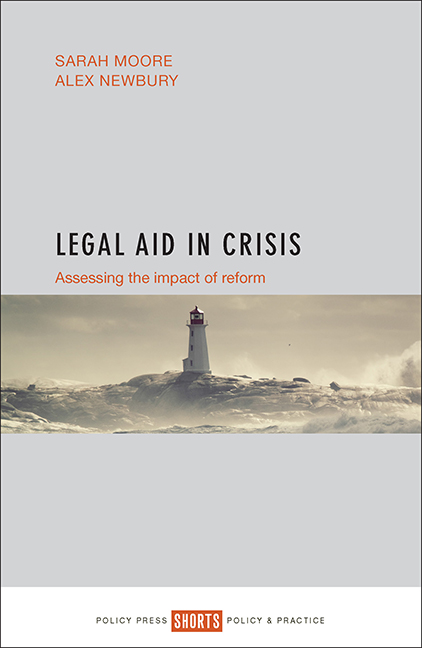Book contents
- Frontmatter
- Dedication
- Contents
- List of abbreviations
- Acknowledgements
- 1 Legal aid in crisis
- 2 Legal aid reform in historical and international perspective
- 3 Assessing the consequences of legal aid reform in England and Wales
- 4 Towards a holistic conception of legal aid
- 5 Refocusing the debate about legal aid
- List of statutes
- References
- Index
2 - Legal aid reform in historical and international perspective
Published online by Cambridge University Press: 05 April 2022
- Frontmatter
- Dedication
- Contents
- List of abbreviations
- Acknowledgements
- 1 Legal aid in crisis
- 2 Legal aid reform in historical and international perspective
- 3 Assessing the consequences of legal aid reform in England and Wales
- 4 Towards a holistic conception of legal aid
- 5 Refocusing the debate about legal aid
- List of statutes
- References
- Index
Summary
Legal aid, broadly-conceived, has a long history. As Pollock notes, help to cover the costs of legal dispute ‘has existed as long as the law itself ‘ (Pollock, 1975: 9). He's thinking, in the main, about the charitable and often ad hoc support provided by lawyers. Statutory protections date back to an Act passed in 1495 that allowed Justices in the superior courts to order legal advocates to advise and represent litigants who lacked the means to pay (Pollock, 1975: 10). Special provision was made in criminal courts, where a system of ‘dock briefs’ operated, meaning that any robed barrister could be called upon in court to offer cheap representation to an unassisted person (Roshier and Teff, 2013). The late 19th and early 20th century also saw the growth of voluntary services providing legal aid, most notably ‘poor man's lawyers’, who offered free legal support to people living in impoverished areas of London (Leat, 1975).
In short, subsidised, charitable and free support for legal dispute resolution has existed for centuries. Until the mid-20th century, though, it was largely inadequate, depending upon judges to intervene and direct assistance, and lawyers to shoulder the cost of advocacy. Provision was of inconsistent quality, directed at the very poor, and subject to regional variation. The creation of a modern legal aid system in the post-Second World War period was directed at changing all this. This chapter examines the emergence of publicly funded legal aid in England and Wales, considers its historical development and then places it in international context.
The early years of the legal aid scheme in England and Wales
In Chapter One we discussed the mid-20th century access to justice movement, noting its focus on meaningful equality of access to legal remedy, as opposed to formal equality before the law. It is no surprise that this idea took root in the then-emerging welfare regimes of northern Europe and the post-fascist regimes of southern Europe. It is in such political climates that publicly funded legal aid first emerged (Garth and Capelletti, 1978). It did so partly because it answered to the practical problems of charitable provision touched on earlier and, more importantly, because it chimed with – indeed, expressed – the idea that the state's principal role lay in advancing the opportunities and wellbeing of its citizens.
- Type
- Chapter
- Information
- Legal Aid in CrisisAssessing the Impact of Reform, pp. 15 - 36Publisher: Bristol University PressPrint publication year: 2017



